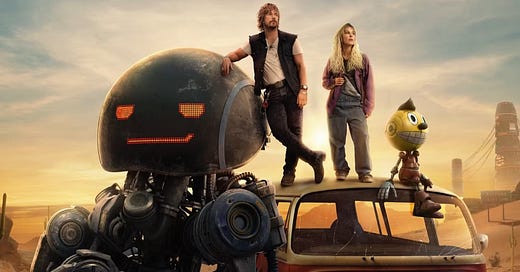The Electric State
The Russo brothers' latest is a mixed bag that receives the most marginal of recommendations.
Film Yap is a reader-supported publication. To receive new posts and support my work please consider becoming a free or paid subscriber.
The Russo brothers take a $320 million stab at aping Steven Spielberg (specifically “A.I. Artificial Intelligence” and “Ready Player One”) with “The Electric State” (streaming on Netflix beginning Friday, March 14). The Russos aren’t successful in besting The Beard and the picture has its fair share of problems, but it isn’t anywhere near as bad as you’ve heard. This isn’t the death knell of cinema, though I am curious where the bulk of that budget went.
In an instance of retrofuturism we open in 1990 with humanity on the cusp of war with robots. Michelle (Millie Bobby Brown) is a teenager who’s oblivious to such things. She’s more concerned with being a good big sister to her genius of a little brother Christopher (Woody Norman, “C’mon C’mon”).
Michelle’s world gets turned upside down when a car accident leaves her Mom (Anthony Russo’s wife, Ann) and Dad (Greg Cromer) deceased and Christopher in a coma. She’s sent to live with Ted (Jason Alexander), her turd of a foster father.
A reprieve comes when a robot turns up at Casa de Ted. It’s the embodiment of Kid Cosmo (voiced by voice work virtuoso Alan Tudyk), the title character from the cartoon Christopher and Michelle used to watch and enjoy.
Michelle and Kid Cosmo run away from home after an altercation with Ted by hitching a ride aboard a Pork Chop Express-esque big rig belonging to soldier-turned-bootlegger Keats (Chris Pratt, coming off like Star-Lord-lite) and his robot sidekick Herman (voiced by Anthony Mackie). All of them are being pursued by Col. Marshall Bradbury aka The Butcher of Schenectady (Giancarlo Esposito), who takes his marching orders from tech dick Ethan Skate (Stanley Tucci, saddled with stock villain shtick).
Michelle needs to meet up with Dr. Amherst (Ke Huy Quan) to get answers about Christopher and the bunch of ‘em team up with robots Mr. Peanut, Popfly and Penny Pal (voiced by Woody Harrelson, Brian Cox and Jenny Slate, respectively) in order to take on Bradbury and Skate.
I’m unfamiliar with Swedish artist Simon Stålenhag’s 2018 graphic novel of the same name which served as inspiration for the film so I have no basis for comparison, but I can say there’s a lot about the movie that I admired and a lot that I did not.
The good: I was moved by the relationship between Michelle and Christopher. I liked the beginning and the end of the picture. I felt as though Brown and Pratt had pretty decent chemistry. I loved Herman via Mackie’s distorted vocal performance – Martin Klebba (soon to be heard as Grumpy in next week’s “Snow White”) also deserves a lot of credit as the man in the suit. Esposito does a lot with a little making his antagonist interesting and even empathetic. Many of the songs selected for the soundtrack are dope despite also being arguably obvious. Most of the special effects done by titans such as Industrial Light & Magic and Digital Domain and scads of other houses are generally cool and convincing.
The bad: The middle of the picture is a slog and I often found myself disinterested. Tucci and Quan are solid actors who just aren’t given a chance to shine. I didn’t really care much for most of the robots outside of Kid Cosmo and Herman. I found the design of a lot of these characters to be off-putting (seriously, Mr. Peanut may well serve as nightmare fuel) and the writing done for them by screenwriters Christopher Markus and Stephen McFeely (frequent collaborators of the Russo’s over at Marvel) often reads as childish, obvious and unfunny.
“The Electric State” is a mixed bag of a movie that certainly didn’t necessitate its $320 million budget, but there’s enough good here to make it the most marginal of recommendations. I suspect it may also play better to kids as opposed to jaded critics.





